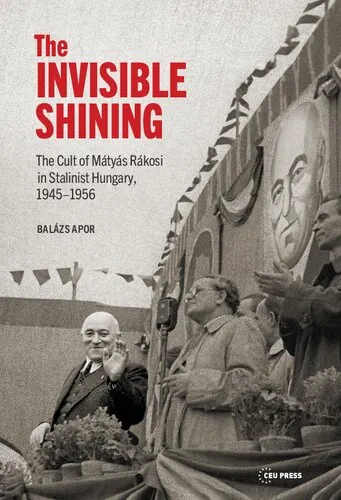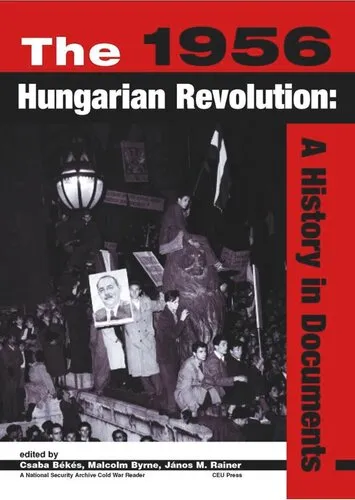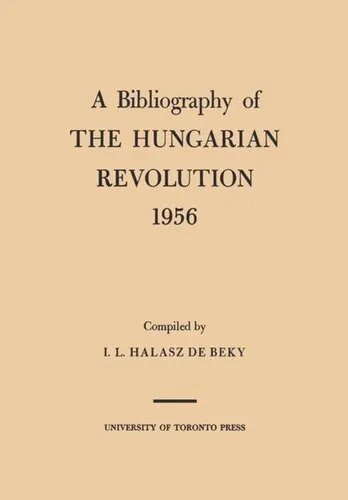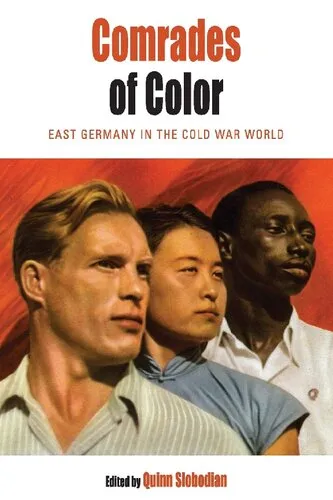The invisible shining the cult of Mátyás Rákosi in Stalinist Hungary, 1945-1956
4.3
بر اساس نظر کاربران

شما میتونید سوالاتتون در باره کتاب رو از هوش مصنوعیش بعد از ورود بپرسید
هر دانلود یا پرسش از هوش مصنوعی 2 امتیاز لازم دارد، برای بدست آوردن امتیاز رایگان، به صفحه ی راهنمای امتیازات سر بزنید و یک سری کار ارزشمند انجام بدینکتاب های مرتبط:
کتاب "The Invisible Shining: The Cult of Mátyás Rákosi in Stalinist Hungary, 1945-1956" به قلم «بالاش آپور»، به بررسی فرهنگ پرستش شخصیتی میاتیاش راکوشی در دوران استالینگرایی در مجارستان از ۱۹۴۵ تا ۱۹۵۶ میپردازد. نگارش این کتاب با استفاده از منابع تاریخی متنوع و تحلیلهای جامع، به گونهای است که به خواننده اجازه میدهد به درک عمیقتری از این دوره حساس در تاریخ مجارستان برسد.
خلاصهای از کتاب
کتاب شامل نگاهی دقیق به دورهای میشود که طی آن میاتیاش راکوشی، رهبر حزب کمونیست مجارستان، توانست پایههای حکومت خود را بر اساس پرستش شخصی و سیاستهای استالینیستی بنا نهد. در این دوره، پرستش راکوشی به ابزار قدرتمندی برای کنترل اجتماعی و سیاسی در مجارستان تبدیل شد. نویسنده با بررسی اسناد، تبلیغات و روایتهای افراد مختلف، فرآیند شکلگیری این فرهنگ و اثرگذاری آن بر جامعه و سیاست آن زمان را به تصویر میکشد.
نکات کلیدی
- نقش تبلیغات در شکلدهی فرهنگ پرستش راکوشی
- روشهای استفاده شده برای کنترل اجتماعی و سیاسی از طریق پرستش شخصیتی
- تأثیر سیاستهای استالینیستی بر جامعه و اقتصاد مجارستان
- چگونگی پایداری و فروپاشی این نظام پرستشی
نقلقولهای مشهور از کتاب
"بهترین راه برای درک سلطه راکوشی، نگاهی عمیق به پراکندگی تبلیغات او در دل و جان مردم است."
"در نظامی که بر اساس پرستش شخصیتی بنا شده است، حقیقت میتواند به آسانی قربانی قدرت شود."
چرا این کتاب اهمیت دارد
مطالعه این کتاب برای کسانی که به تاریخ اروپا و خصوصاً دوران پس از جنگ جهانی دوم علاقه دارند، بسیار اهمیت دارد. کتاب "The Invisible Shining" نه تنها به بررسی تاریخی این دوره پرداخته است، بلکه با تحلیل سازوکارهای سیاسی و اجتماعی که به استقرار و دوام پرستش شخصیتی در مجارستان انجامید، به خواننده امکان میدهد تا از درسهای تاریخی برای درک بهتر دنیای معاصر بهرهبرداری کند. این کتاب همچنین به تحلیل دقیقتر تبلیغات و تأثیرات روانشناختی آن در جوامع میپردازد، که همچنان در بسیاری از بخشهای جهان معاصر قابل مشاهده است.
The Invisible Shining: The Cult of Mátyás Rákosi in Stalinist Hungary, 1945-1956
Written by Balázs Apor, "The Invisible Shining: The Cult of Mátyás Rákosi in Stalinist Hungary, 1945-1956" delves deep into the intricate and often sinister dynamics of political cultism during the post-war era in Hungary. This comprehensive examination offers insights into how Mátyás Rákosi, the leader of the Hungarian Communist Party, developed a cult of personality analogous to that of Stalin in the USSR. The book is an essential read for anyone interested in Cold War-era politics, authoritarian regimes, and the psychological mechanisms behind the making of a political cult.
Detailed Summary
"The Invisible Shining" meticulously charts the rise of Mátyás Rákosi as a central figure in Hungarian politics and examines the means by which he was able to consolidate power and influence both public perception and policy. Through archival research and analysis of contemporary media, Apor reveals how Rákosi's image was crafted meticulously to present him as an infallible leader whose authority was unquestionable. The book explores the systematic propaganda mechanisms employed, including state-controlled media, education systems, and public festivities, that helped embed Rákosi’s personality cult within the fabric of everyday Hungarian life.
Apor also addresses the pervasiveness of fear and coercion that underpinned the cult's success, showing how dissent was often brutally suppressed and how loyalty was continually reinforced through an atmosphere of vigilance and paranoia. The narrative provides a compelling analysis of how Rákosi's cult operated within the broader context of Stalinist Europe, comparing and contrasting it with similar regimes whilst uniquely focusing on the socio-political landscape of subjugated Hungary.
Key Takeaways
- The Nature of Cult Creation: The book highlights the processes of deification in political arenas and the crucial factors that contribute to the formation of a personality cult.
- Historical Insights: Provides a comprehensive overview of Hungary's political climate in the immediate post-war period, filling in historical knowledge gaps about Central European communism.
- Mechanics of Propaganda: Offers an in-depth look at the role of propaganda and its far-reaching impacts on society and politics.
- Societal Impact: Illuminates the long-term effects of political cults on societies, particularly focusing on fear, indoctrination, and societal restructuring.
Famous Quotes from the Book
"The shine of a cult, much like an invisible glow, warms those who endorse it while searing the dissenters with its intensity."
"Rákosi’s Hungary became not just a political entity, but a reflection of one man’s envisioned utopia, enforced through breathtaking discipline and relentless propaganda."
Why This Book Matters
"The Invisible Shining" is significant for its scholarly contribution to understanding the cult of personality within a distinct historical setting. Balázs Apor provides a rare, in-depth examination of Rákosi's Hungary, revealing broader truths about human susceptibility to authoritarianism under certain socio-political conditions. The book serves as a cautionary tale about the dangers of unchecked power, the manipulation of ideology, and the role of propaganda in shaping national identities. It contributes to historical scholarship by illuminating an era often overshadowed by more dominant Western narratives of the Cold War.
Furthermore, with its detailed research and keen analysis, the book is an invaluable resource for historians, political scientists, and those with a keen interest in the mechanisms of dictatorship. It offers lessons that remain relevant today, echoing through modern discussions about the resurgence of authoritarian sentiments worldwide.
دانلود رایگان مستقیم
You Can Download this book after Login
دسترسی به کتابها از طریق پلتفرمهای قانونی و کتابخانههای عمومی نه تنها از حقوق نویسندگان و ناشران حمایت میکند، بلکه به پایداری فرهنگ کتابخوانی نیز کمک میرساند. پیش از دانلود، لحظهای به بررسی این گزینهها فکر کنید.
این کتاب رو در پلتفرم های دیگه ببینید
WorldCat به شما کمک میکنه تا کتاب ها رو در کتابخانه های سراسر دنیا پیدا کنید
امتیازها، نظرات تخصصی و صحبت ها درباره کتاب را در Goodreads ببینید
کتابهای کمیاب یا دست دوم را در AbeBooks پیدا کنید و بخرید
1355
بازدید4.3
امتیاز50
نظر98%
رضایتنظرات:
4.3
بر اساس 0 نظر کاربران
"کیفیت چاپ عالی بود، خیلی راضیام"







